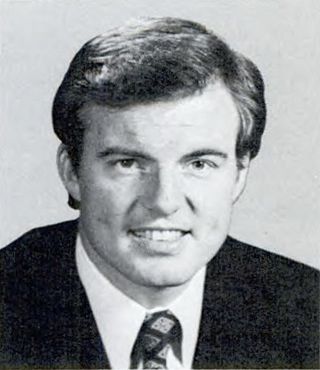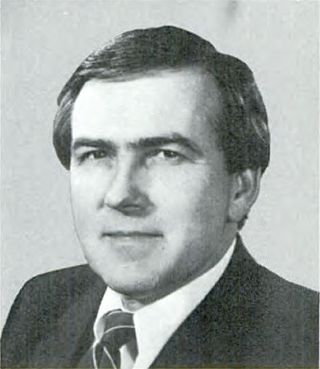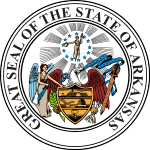
Frank Durward White was an American banker and politician who served as the 41st governor of Arkansas. He served a single two-year term from 1981 to 1983.

James Guy Tucker Jr. is an American former politician, businessman, and attorney who served as the 43rd governor of Arkansas from 1992 until his resignation in 1996 after his conviction for fraud during the Whitewater affair. A member of the Democratic Party, he previously served as the 15th lieutenant governor, state attorney general, and as a U.S. representative.

Joe Edward Purcell was an American politician and attorney who served as Acting Governor of Arkansas for six days in 1979. A member of the Democratic Party, he served as the 45th Attorney General of Arkansas from 1967 to 1971 and the 13th Lieutenant Governor of Arkansas from 1975 to 1981.

Tommy Franklin Robinson is an American businessman, lobbyist, and politician who served as the U.S. representative for Arkansas's 2nd congressional district from 1985 to 1991. He is a member of the Republican Party. Before he was elected to Congress, Robinson was the sheriff of Pulaski County.

The Democratic Governors Association (DGA) is a Washington, D.C.-based 527 organization founded in 1983, consisting of U.S. state and territorial governors affiliated with the Democratic Party. The mission of the organization is to provide party support to the election and re-election of Democratic gubernatorial candidates. The DGA's Republican counterpart is the Republican Governors Association. The DGA is not directly affiliated with the non-partisan National Governors Association. Meghan Meehan-Draper is currently the DGA's executive director, while Tim Walz is the current chair.

United States gubernatorial elections were held on November 5, 2002, in 36 states and two territories. The Republicans won eight seats previously held by the Democrats, as well as the seat previously held by Minnesota governor Jesse Ventura, who was elected on the Reform Party ticket but had since renounced his party affiliation. The Democrats won 10 seats previously held by the Republicans, as well as the seat previously held by Maine governor Angus King, an independent. The elections were held concurrently with the other United States elections of 2002.

The Democratic Party of Arkansas is the affiliate of the Democratic Party in the state of Arkansas. The current party chair is Grant Tennille.

The 1980 Arkansas gubernatorial election was a biennial election for the governorship of Arkansas. One-term Democratic Governor and future President Bill Clinton was narrowly defeated by Republican Frank D. White. It was only the third time since Reconstruction that a Republican candidate had won the state's governorship.

The 1978 Arkansas gubernatorial election, held on November 7, was the first time that future President Bill Clinton was elected Governor of Arkansas.
Bill Clinton served as the 42nd president of the United States (1993–2001) and as the 40th and 42nd governor of Arkansas. A member of the Democratic Party, Clinton first ran for a public office in 1974, competing in the congressional election for Arkansas's 3rd congressional district. After narrowly losing to incumbent representative John Paul Hammerschmidt, he ran for the office of Arkansas Attorney General in 1976. He won the Democratic primary comfortably, receiving over 55% of the popular vote. Witnessing his strong support during the primaries, Republicans did not nominate a candidate to run against him. Clinton won the general election unopposed. His experience as the attorney general was considered a natural "stepping-stone" to the governorship.

Edward Sheffield Nelson, known as Sheffield Nelson, is an American attorney, businessman and politician from the capital city of Little Rock, Arkansas. Originally a Democrat, Nelson in 1990 ran for governor of Arkansas as a Republican against then governor and future U.S. President Bill Clinton and in 1994 against another Democrat, the incumbent Governor Jim Guy Tucker.

The 2011 Kentucky gubernatorial election was held on November 8, 2011, to elect the governor of Kentucky and the lieutenant governor of Kentucky. Incumbent Democrat Steve Beshear won re-election, defeating Republican challenger David L. Williams, then the president of the state senate, and Gatewood Galbraith, an independent candidate. Statewide turnout in this election was 28%.

The 1996 United States elections were held on November 5. Democratic President Bill Clinton won re-election, while the Republicans maintained their majorities in both houses of the United States Congress.

The 1992 United States elections elected state governors, the President of the United States, and members of the 103rd United States Congress. The election took place after the Soviet Union crumbled and the Cold War ended, as well as the redistricting that resulted from the 1990 census. Often considered "The Year Of The Woman," these elections brought an increased number of female politicians to Washington such as Dianne Feinstein (D-CA) and Carol Moseley Braun (D-IL). Governor Bill Clinton of Arkansas defeated incumbent President George H. W. Bush and businessman Ross Perot in the presidential election. The Democratic Party maintained their control of both chambers of Congress. This is the first Democratic trifecta since the Republican victory in the 1980 elections and the last one during the 20th century and the last one overall until 2008.

The 1996 United States Senate election in Arkansas was held on November 5, 1996. Incumbent Democratic U.S. Senator David Pryor decided to retire. Republican Tim Hutchinson won the open seat, becoming the first Republican to win a U.S. Senate seat in Arkansas since Reconstruction in 1872 and the first to ever be popularly elected in the state. He was the first to win this seat since 1870. Hutchinson lost re-election in 2002 to David Pryor's son Mark Pryor.

The 2014 Arkansas gubernatorial election was held on November 4, 2014, to elect the Governor of Arkansas, concurrently with the election to Arkansas's Class II U.S. Senate seat, as well as other elections to the United States Senate in other states and elections to the United States House of Representatives and various state and local elections. This was the last time the Arkansas Governor’s changed partisan control.

The 1986 Arkansas gubernatorial election was conducted on November 4, 1986, to elect the Governor of Arkansas.

The 1992 Montana gubernatorial election took place on November 3, 1992. Incumbent Governor of Montana Stan Stephens, who was first elected in 1988, declined to seek re-election. Marc Racicot, the Attorney General of Montana, won the Republican primary and advanced to the general election, where he faced State Representative Dorothy Bradley, who had emerged from a crowded Democratic primary as the nominee of her party. A close election ensued, but in the end, Racicot ended up defeating Bradley to win his first of two terms as governor. While on the same ballot, Democrat presidential candidate Bill Clinton won the state of Montana, and eventually won the 1992 United States presidential election.

The 1976 Arkansas gubernatorial election was held on Tuesday November 2, Incumbent Democratic Governor David Pryor defeated Republican candidate Leon Griffith with 83.24% of the vote.

Bill Clinton served two tenures as governor of Arkansas. Elected in 1978, Clinton first served as governor for a single term from 1979 until 1981, losing his bid for reelection in 1980. After a two-year interregnum, Clinton returned to the governorship after winning the 1982 election. Clinton would be elected to five further terms, serving until mid-December, 1992, when he resigned amid his transition into the U.S. presidency after having been elected president in the 1992 United States presidential election. Clinton was the second-longest serving governor in the state's history, after Orval Faubus.
























